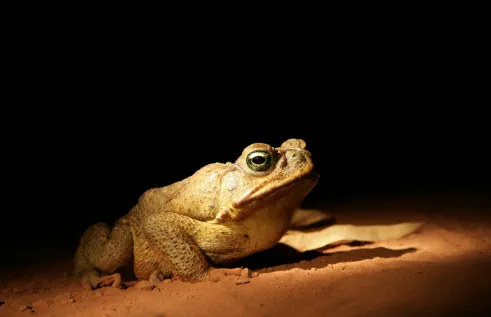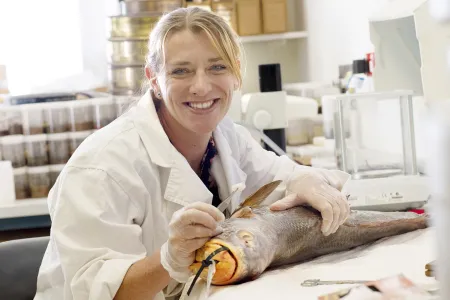News Article
Jewfish survey to uncover critical gaps
Research into the highly prized Black jewfish will aim to address critical knowledge gaps regarding the fishery in the Northern Territory.
Charles Darwin University post-doctoral research fellow Dr Joanne Randall said increased catches in recent years were inconsistent with model forecasts, and that improved knowledge of environmental drivers behind population dynamics were needed to support the sustainable management of the fishery.
“The Black jewfish is a large-bodied species of croaker that is highly prized for its angling and table qualities,” Dr Randall said.
“They have been heavily overfished across their tropical Indo-West Pacific distribution, with northern Australia – from the western Gulf of Carpentaria to northern Western Australia –remaining one of the last strongholds of this species.
“Current stock assessments are based on assumed stock-recruitment relationships and catch-and-effort data,” she said. “We need a more robust model that includes environmental data to ensure a better understanding of the drivers of fishery productivity and to provide reliable information on abundance and size structure.”
Dr Randall is working with the Australian Institute of Marine Science and the Department of Primary Industry and Resources, Fisheries Division, and collaborating with commercial and recreational fishers to sample jewfish along the NT’s coastlines including the Tiwi Islands.
“We are collecting environmental data at four sites at various times of the year, and assessing age, sex, size, weight and general health to gain a better assessment of the possible environmental factors impacting their behaviour and diet,” she said.
“This will address critical knowledge gaps regarding the abundance and size-structure of Black jewfish populations and examine how the physiology of fish can change in response to environmental variability, such as rainfall.”
The research findings will assist managers to develop harvest strategies that can rebuild populations and ensure a sustainable fishery for future Territorians to enjoy. Preliminary results will be presented at the World Fisheries Congress in October 2020.
The research is funded by the Fisheries Research and Development Corporation.
Related Articles

Nanoplastics hindering cognitive abilities of fish, international research shows
Nanoplastic exposure can impair the cognitive abilities of fish and could lead to significant impacts on marine species’ ability to survive, according to a new international study.
Read more about Nanoplastics hindering cognitive abilities of fish, international research shows
Eradication would cost billions: NT’s lessons for Pilbara’s cane toad management
Cane toads are predicted to invade Western Australia’s Pilbara region by 2041 if left unchecked, but the Northern Territory’s population of the pests hold key lessons that could save billions in eradication costs.
Read more about Eradication would cost billions: NT’s lessons for Pilbara’s cane toad management
New project to grow Indigenous aquaculture on one of Australia’s largest islands
An Australian island’s efforts to improve food security and transition into a blue economy will be bolstered by a new project to propagate a nutritious and increasingly popular fish.
Read more about New project to grow Indigenous aquaculture on one of Australia’s largest islands
